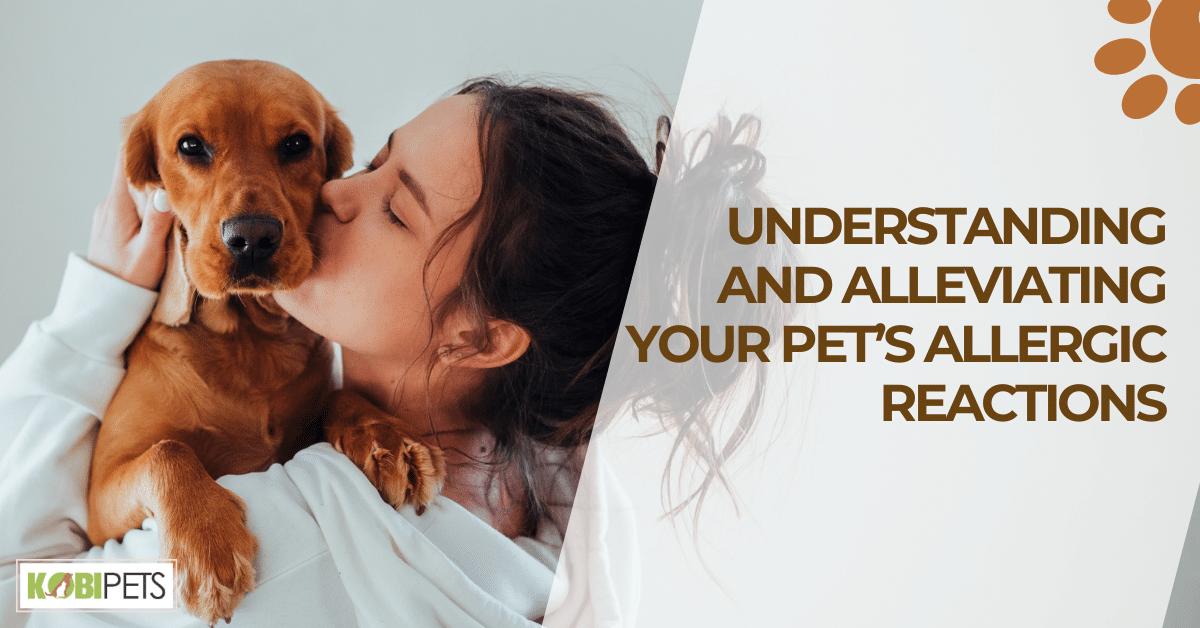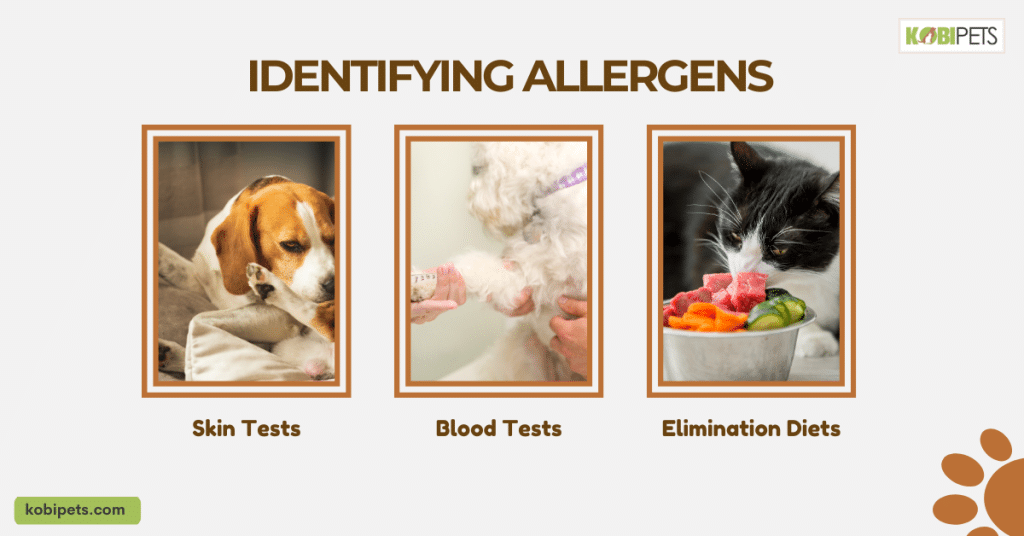
Pets, like humans, can suffer from allergic reactions that can be uncomfortable and even dangerous. Understanding your pet’s allergies is the first step towards providing relief. Consult with a veterinarian to identify allergens, explore treatment options, and create a safe and comfortable environment to alleviate your furry friend’s discomfort and improve their quality of life.
Pet allergies can disrupt both our pets’ and our own lives. In this article, we’ll explore why it’s crucial to understand and manage them. We’ll cover everything from recognizing symptoms to effective treatments and creating a safe pet environment. Join us in ensuring your furry friends lead healthier, happier lives.
Types of Pet Allergies
Pet allergies are more common than you might think and can significantly impact your furry friend’s quality of life. In this informative article, we’ll dive into the realm of pet allergies to help you better understand and manage them. We’ll begin by exploring the different types of allergies that can affect your pets, shedding light on common culprits and how to recognize them.
Food Allergies
Food allergies in pets can manifest as a perplexing challenge for both pet owners and their furry companions. These allergies often stem from specific ingredients in your pet’s diet, such as proteins like beef, chicken, or fish.
Common symptoms of food allergies in pets include itching, skin rashes, digestive issues, and ear infections. To identify and manage food allergies effectively, consider switching to a hypoallergenic diet prescribed by your veterinarian.

Environmental Allergens
Environmental allergens like pollen and dust mites are pervasive culprits that can negatively impact your pet’s health and quality of life. Pets exposed to these allergens may experience symptoms such as sneezing, watery eyes, and itchy skin.
Identifying the signs of environmental allergies is crucial to taking prompt action. You can minimize your pet’s exposure to these allergens by keeping them indoors during peak pollen seasons, using air purifiers, and regularly cleaning your home.

Contact Allergies
Contact allergies, though less common, can pose a significant challenge to your pet’s comfort. These allergies result from physical contact with irritants like certain plants, fabrics, or grooming products. Symptoms often include skin redness, itching, and inflammation. To address contact allergies effectively, you must first identify the specific allergen causing the reaction. This may involve some detective work, but it’s essential for your pet’s well-being.
Understanding the various types of pet allergies is the first step towards helping your beloved pet lead a healthier, happier life. Armed with this knowledge, you can now be better prepared to recognize and address allergies specific to your pet’s needs.

Identifying Allergens
Identifying the specific allergens that trigger reactions in your pet is a pivotal step in managing their allergies effectively. In this section, we’ll delve into the methods and tests employed by veterinarians to identify these allergens. We’ll also explore why pinpointing the exact culprits is so crucial and how cross-reactivity can complicate matters for our furry friends.

Identifying Allergens
- Skin Tests: Skin tests are a widely used method for identifying allergens in pets. They involve the introduction of tiny amounts of potential allergens either beneath your pet’s skin (intradermal testing) or on their skin’s surface (epicutaneous testing).
- Blood Tests: Blood tests, such as the enzyme-linked immunosorbent assay (ELISA), are a less invasive approach to allergy testing. These tests detect specific antibodies in your pet’s blood that react to allergens.
- Elimination Diets: Elimination diets are primarily used to identify food allergies in pets. These diets involve a systematic process of selecting and controlling your pet’s food to pinpoint specific food allergens. The most significant advantage of elimination diets is their precision in identifying food allergies, allowing for highly targeted dietary modifications that can alleviate your pet’s symptoms effectively.
Identifying the allergens that affect your pet is a crucial part of their allergy management journey. By understanding the testing methods available and the significance of precision, you can work with your veterinarian to create a tailored treatment plan that addresses your pet’s specific needs.
Treatment Options
In this comprehensive section, we’ll explore a spectrum of treatment options available to manage your pet’s allergies. From dietary adjustments and medications to cutting-edge immunotherapy, we’ll delve into the pros and cons of each method.
- Dietary Changes: Dietary modifications play a pivotal role in managing food allergies in pets. Pros include precise allergen avoidance through specialized hypoallergenic diets. However, it can be challenging to find the right diet, and compliance can be an issue for some pets.
- Medications: Medications like antihistamines, corticosteroids, and immunosuppressive drugs can offer relief from allergy symptoms. They provide quick results and can be crucial during severe flare-ups. However, long-term use may have side effects, and they may not address the root cause.
- Immunotherapy: Immunotherapy, such as allergy shots or sublingual drops, aims to desensitize pets to allergens over time. It offers long-term relief and addresses the underlying cause of allergies. However, it requires commitment, as it typically involves an extended treatment period.
- Topical Treatments: Shampoos, creams, and sprays can provide localized relief for skin allergies. They are easy to administer and can soothe irritated skin. On the downside, their effects may be temporary, and some pets may not tolerate topical treatments well.
Your pet’s health and happiness are at the heart of every decision you make, and managing their allergies is no exception. With the knowledge gained from this exploration of treatment options and real-life success stories, you can embark on a journey towards providing your furry companion with the comfort and relief they deserve.

Creating an Allergy-Friendly Environment
Ensuring that your home is a sanctuary free from allergy triggers is paramount for your pet’s comfort and well-being. Regular cleaning routines should include frequent washing of your pet’s bedding and regular vacuuming of carpets and upholstery to minimize the accumulation of allergens.
Introducing air purifiers equipped with high-efficiency particulate air (HEPA) filters can significantly enhance air quality by capturing allergens and other airborne particles. Moreover, opting for hypoallergenic pet products, such as shampoos and cleaning supplies, can effectively reduce allergen exposure during grooming and daily care.

When to Consult a Veterinarian
Recognizing when it’s time to seek professional veterinary guidance for your pet’s allergies is pivotal in ensuring their well-being. Persistent or severe symptoms, such as relentless itching, recurrent skin infections, or gastrointestinal distress, should prompt immediate consultation with a veterinarian. These signs may indicate complex or underlying conditions that require expert diagnosis and treatment.
While well-intentioned, self-diagnosis and treatment may not always suffice, and it’s crucial to avoid delays in addressing your pet’s discomfort. Veterinary expertise is essential in identifying specific allergens and tailoring treatment plans to your pet’s unique needs.

In conclusion
Taking proactive steps to create an allergy-friendly environment for your pet and knowing when to seek professional veterinary guidance are key elements in managing your pet’s allergies effectively.
By maintaining a clean and allergen-minimized living space and seeking timely veterinary consultation for persistent or severe symptoms, you can ensure your furry companion enjoys a life free from the discomfort of allergies. Regular veterinary check-ups also play a pivotal role in monitoring changes and adjusting treatment plans as needed.






